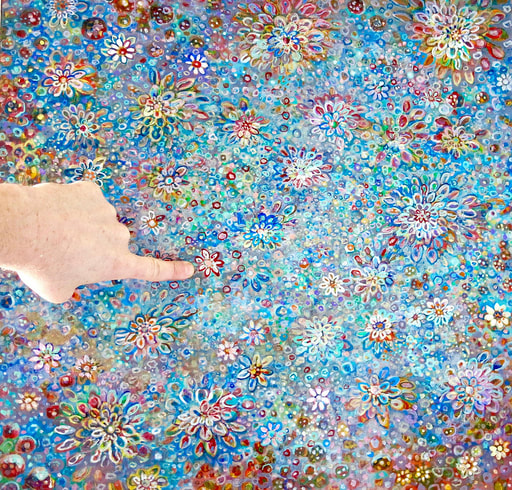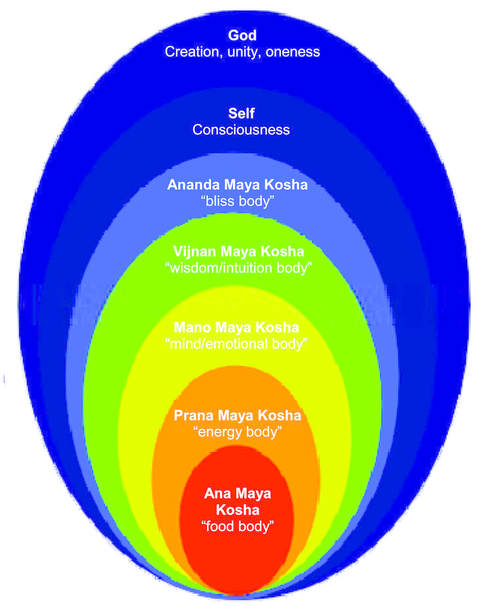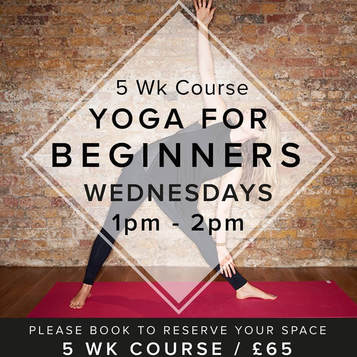|
27/9/2022 0 Comments 2 New Counselling Sites AvailableCurrently taking enquiries for in-person sessions at 2 locations in South London at Clapham North and Clapham. Chancery Lane and Zoom are also still available.
0 Comments
Beginning April 2019, I will also be available to see clients on Thursdays and Fridays at Feel Good Balham in South London. Email me to enquire as I am not on their website yet! http://www.feelgoodbalham.co.uk/
Would love to do what this Yale Professor is doing! Biggest takeaway from the article for me... "The root stem of happiness is "happenstance" - chance, luck or fortune.
Research shows that while genetics plays a large part, accounting for half our happiness, what we do each day accounts for 40%, with just 10% down to our life circumstances." 26/1/2019 0 Comments January 26th, 2019Join me for a 2 hour Saturday workshop to explore how yoga can help us to manage our anxiety. More info in the link! Hope to see you there!
29/12/2018 1 Comment An Article on Rumination"For There is Nothing Either Good or Bad, But Thinking Makes It So"- Shakespeare/ Hamlet  Highlight: "Rumination is “an unproductive way of cycling through those things repeatedly without ever gaining any insight into what those events mean in the bigger picture,” Ochsner says. The problem is when we don’t gain any psychological distance from these events and fail to gain greater perspective about them: if you’re just refreshing an argument with your partner in your head like webpage on your browser, you’re not really getting anywhere. This pattern of rehearsal becomes more damaging when paired with the self-narratives that can spiral into depression, where “every event becomes a referendum on your negative self-worth,” Ochsner says. There’s enough ambiguity in life that if you’re looking for a negative interpretation of events, you’re going to find it: if your new coworker can’t make it to lunch, it must be because you’re so unlikeable. Then, if this pattern continues, you ruminate on that collegial slight every time you see them. There’s a claustrophobic inflexibility to the pattern: It’s a “cycle of reliving without reframing,” Ochsner says. Rumination has been found again and again to be a strong mediator for anxiety and a huge risk factor for depression, including in a 137-person study that tracked people for 2.5 years. People who ruminate frequently are less forgiving of themselves, abuse alcohol more, take more risks driving, and are at greater risk of suicidal ideation."- Drake Baer Entire Article Below plus website link: When human brains have nothing else to do, they think. Even if you’ve meditated for 3,000 hours, you’ll still get thoughts popping into your head every ten seconds or so. When people are put into brain scanners and don’t have a task to do, their brains inevitably start reflecting or planning. Narrating to ourselves what has happened or could happen is such a central part of the human experience that neuroscientists have come to call it the brain’s default mode. Moment by moment, we’re piecing together our life stories. While there is some disagreement, the scientific community generally sees this as a good thing. But there’s one particular form that researchers say can be particularly destructive. Not all stories we tell ourselves are helpful; some are self limiting, and you find yourself running a half marathon to learn that you’re capable of being athletic. “We live through our stories rather than living with our stories,” says Jim Carmody, PhD, a professor of preventative medicine at the University of Massachusetts medical school and a lifelong meditation practitioner. While no one’s ever seen a thought “standing in the living room,” Carmody says that people tend to take their thoughts to be real and objectively true. But in contrast to lamps, chairs, computers and the like, thoughts aren’t objects out in the world; they’re mental events. Still, without some sort of training, we spend our lives so immersed in our opinions about people, places and things — including ourselves — that we mistake the stories we tell about reality for reality itself. It’s a form of what social psychologists call “naive realism”: that your experience of something is the final word on that thing, that if somebody made you mad, it’s because they’re a bad person, or if you just got dumped, that must mean you’re unloveable. These self-narratives get especially self-limiting — or even self-destructive — in the form of pathological rumination, a mental process that’s a key player in depression and anxiety disorders. Kevin Ochsner, the director of Columbia University’s Social Cognitive and Affective Neuroscience Lab, tells Thrive Global that rehashing negative experiences is likely just a part of the way humans are built: your brain tags difficult times as significant experiences, and they get replayed in your memory — one of the main ways the brain stores anything for later retrieval. Rumination is “an unproductive way of cycling through those things repeatedly without ever gaining any insight into what those events mean in the bigger picture,” Ochsner says. The problem is when we don’t gain any psychological distance from these events and fail to gain greater perspective about them: if you’re just refreshing an argument with your partner in your head like webpage on your browser, you’re not really getting anywhere. This pattern of rehearsal becomes more damaging when paired with the self-narratives that can spiral into depression, where “every event becomes a referendum on your negative self-worth,” Ochsner says. There’s enough ambiguity in life that if you’re looking for a negative interpretation of events, you’re going to find it: if your new coworker can’t make it to lunch, it must be because you’re so unlikeable. Then, if this pattern continues, you ruminate on that collegial slight every time you see them. There’s a claustrophobic inflexibility to the pattern: It’s a “cycle of reliving without reframing,” Ochsner says. Rumination has been found again and again to be a strong mediator for anxiety and a huge risk factor for depression, including in a 137-person study that tracked people for 2.5 years. People who ruminate frequently are less forgiving of themselves, abuse alcohol more, take more risks driving, and are at greater risk of suicidal ideation. With rumination being an on-ramp to depression and anxiety disorders, it’s not just a personal concern, but a global public health issue. About one in 21 people worldwide will experience major depression in their lives, estimates indicate, and one in 13 are experiencing an anxiety disorder. According to the Lancet’s authoritative Global Burden of Disease Study, major depressive and anxiety disorders are the third and ninth leading causes of disability worldwide. The World Health Organization estimates that depression and anxiety cost the global economy $1 trillion every year — and these conditions aren’t limited to the West, but are prevalent in Africa and Asia as well. Still, it’s hard to even realize all this narrativizing is happening without some sort of training. “The cognitive process, the story becomes integrated into our initial experience of the world,” Carmody says. Even as infants, we’re trying to make sense of the world, and by the time language comes online, the self-narrative process has already been interwoven with our sensory experience, even before episodic memory starts forming. Self-narrative develops right along with language use, and that’s all interwoven with sensory experience. Not having a voice in your head commenting on everything “is like going back to the Big Bang,” he says. “It’s so implicitly embedded in our experience of the world that we don’t see it.” And there’s a million years of evolutionary pressure telling you to do so: the forebear that didn’t worry about storing enough food for winter or what went wrong on the last hunt didn’t become your forebear. “This is what attention does,” he says. It’s a needs-based mental function: in addition to noticing opportunities, it highlights threats. In a way, lots of the leading treatments for negative self talk, anxiety, depression and other mental disorders are methods for establishing a new relationship with your predisposition to finding threats, analyzing weaknesses and telling stories about yourself that all those years of evolution handed down to us. Both meditation and cognitive behavioral therapy train you in treating your thoughts with a lighter touch — to, as the Zen maxim says, not believe everything you think. Carmody, the UMass professor, has been meditating for decades, and he likes to say that when you bring awareness to your thoughts, they begin to take on “their natural translucency.” Meditation has been shown to reduce rumination in general populations as well as in people with depression, and CBT helps with everything from depression to generalized anxiety to panic disorders. The combination of the two may be especially effective: mindfulness-based cognitive therapy has been shown to significantly reduce relapse in people who have recovered from depression, at a rate that’s at least as effective as antidepressant medication. With CBT, those self narratives are challenged through “reappraisal,” whether by yourself, with a computer, a therapist, or in a group. This works by rethinking a given situation — examining what people’s intentions might have been, how you might be interpreting whether your ideas about what happened are truly accurate — and with that rethinking, adjusting your emotional reaction. Ochsner says that a big reason for why CBT works so well for people heavy on rumination is that they’ve spent so much time interrogating their own thoughts. With reappraisal, you’re taking that same skill in internal investigations and turning it into something that breaks down barriers, rather than creating them. Like Batman, you’re using abilities trained in darkness for the good of humanity. A handful of mental processes are used in reappraisal: working memory, or your ability to hold multiple objects in mind, like the digits of a phone number; cognitive control, or the ability to focus on some sensations and ignore others; and theory of mind, or your ability to sense what others (and even yourself!) feel in a given situation. When these processes work in concert, you can revise your assumptions, and see situations in new, possibly life-giving light. It happens spontaneously, too, as our aphorisms suggest: when we’re finding silver linings or making lemonade out of lemons, we’re reappraising. You probably want to wait until the strong emotions have subsided, however, Ochsner says, as dramatic experiences tend to limit activity in the frontal lobe, the brain region where lots of the conceptual work of reappraisal gets done. The key first step is to realize that the events in your life didn’t just objectively happen — all emotions have some degree of interpretation, in the way that, Ochsner says, “all of reality is subjective.” This is an insight embedded in the world’s cultural traditions: in Hindu philosophy, it’s postulated that humans experience “maya,” an illusion born of interpretation. In his landmark brain-imaging study of the neurological mechanics of reappraisal, Ochsner quotes Shakespeare’s Hamlet, who observed that ‘‘there is nothing either good or bad, but thinking makes it so.” It’s about getting beyond that naive realism, where you assume that how you think something went down is the ultimate truth of the matter. Carmody, the UMass professor, says that beginning to see your thoughts is a lot like the parable of explaining water to fish: if you’ve spent your entire life immersed in them, it’s hard to see that they’re even there. But with techniques like mindfulness and CBT, it’s easier to see the narratives that structure your life and how you may spend more time than you’d like ruminatively rehearsing them. That way, instead of unconsciously living through your stories, you can choose to live alongside them.
A few weeks ago, I was staying in an airbnb in London. We'd just sold our flat and were not yet able to move into our rental. Realising I'd just left my home/neighborhood of the last 3 years and would have three different moves before settling into our new home, I was feeling all out of sorts and anxious.
This book happened to be on the bookshelf of the Airbnb, and it was like it was meant to be. As a yoga teacher, I've been incorporating mindfulness into my daily life for a couple years now, but we all sometimes need reminders, and we can certainly always gain greater knowledge of a subject. I found myself reading it in one go, and I felt instantly better. This is not to say I didn't still feel disoriented, but it was a reminder that life is full of ups and downs, times of disorientation, times of stability, et cetera. I was able to accept the disoriented/out of place/out of schedule/anxious feelings without trying to "fix" or "escape" from them. I slowed down and noticed what I was experiencing in the present moment and was able to take a step back from my thoughts & emotions without becoming engulfed by them. This made everything so much more manageable. Mindfulness is a holistic tool I recommend to almost everyone. If you've ever thought about getting to know the practice of mindfulness better, this is an easy pick up/put down book with concise writing and manageable tips for incorporating mindfulness and small changes into daily life. I struggle using mindfulness apps (everyone's 1st go-to, it seems); they just don't seem to resonate with me; perhaps because I'm a visual and kinesthetic learner, rather than aural. This book is a tangible and concrete guide on ways to work mindfulness into YOUR life and your schedule. Mindfulness doesn't have to mean two 40 minute sessions a day of sitting in stillness. I find happiness from sitting on a bench and listening to the leaves rustle or feeling the texture of the grass rather than scrolling on my phone and/or letting my thoughts dominate the moment. THIS is mindfulness... choosing to replace 30 seconds of our (insert: busy, scattered, overwhelmed, scary, anxious, sad, angry, etc) thoughts with 30 seconds of the actual present moment. These 30 seconds can add up to a big difference over time.  https://www.forbes.com/sites/forbescoachescouncil/2018/06/19/glass-half-empty-heres-how-to-flip-your-thinking/#15ff68c1482b Click above to read the article from the Forbes Coaches. This article lists helpful ways to increase our positive thinking in our daily lives for anyone suffering from depression, self-doubt, low productivity, et cetera. My favorites are "make it 1% better" and "do 15 minutes a day of conscious value". I often feel like counselling clients are overwhelmed in feeling like they have a limited number of weeks to "fix" their problems. Frustration can occur if a client feels like no change is being made. "How can you make it just 1% better?" is a great question to ask yourself when you're feeling bombarded. Simplifying and working on very small changes is often the best approach to make lasting bigger changes in our mental health overtime. I love the term "conscious value", because it can encompass such a wide variety of things and is changeable. While some days "conscious value" may be a glass of wine with a friend, another day it may be sitting in silence, the next it may be organizing your house, and the next it may be volunteering in a role that benefits society. "Conscious value" differs so much from person to person, and I feel it is really important to devote a few minutes each day to yourself to cultivate growth. Just 15 minutes a day is almost always possible. Details below for New 4 week Course beginning November 14th at Kuu London: Every Tuesday 6:15-7:30 pm
What is it?: A 4 week yoga course led by certified Mental Health Counsellor and yoga teacher, Kristin Crenshaw. This course will explore Hatha yoga and its three main components- Gentle Asana (poses), Pranayama (breathe control), and Deep Relaxation (mantra & meditation). What will we do?: Each class will be formed of poses that help to align the body, create and open space for energy to flow, alleviate stress, lower blood pressure, & minimize emotional dysregulation such as anxiety and depression. We will explore the full potential of the breathe and its calming effect on the mind and body. We will use the breathe in unison with asanas & practice additional breathing techniques at the beginning or end of each class. We will explore deep relaxation thru elements of yoga nidra, meditation, and mantra recitation. All three components of Hatha yoga will come together to create an all-around self-soothing environment focused on your mental and physical health and well-being. Course design: This course will include attention to mind-body awareness, mindfulness, & the yogic elements of the Koshas to better recognize how we understand ourselves and others & how can modify our yoga practice to reflect these elements. Using the Koshic model, we will pay attention to the body as a whole- the physical, energetic, conscious, unconscious, & bliss body. Touches of the basic cognitive behavioral therapy model, the & BREATHE ( Breathe, Reflect, Envision, Action, Transform, Heart, Energy) model will also be included. Each class will have its own theme, handouts, & a short time to journal or exchange ideas with others if desired. Who is this class for: Anyone looking to dive deeper into yoga and connect yoga with their own personal mental health in a supportive & therapeutic environment. Sign up for entire course (receive discount) or pop in for session! Beginner Course at Kuu London- 5 weeks- Wednesday: 1-2 pm
What is it?: For total beginners or level 1 practitioners of yoga who wish to learn or revisit the basics- this class will explore fundamental elements of yoga including yoga theory and asanas (poses). What will we do?: Elements will be broken down at a gentle pace and explained greater in depth. Pose adjustments will be offered, & each class will build upon the next. Class will be interactive with time given for questions or reflecting out loud. Recommended to sign up for full course, since each class will be built upon the last. You can also pop in to a single session if you wish! I find that lots of students come to yoga class seeking alleviation for mental health issues: most commonly, anxiety, depression, & insomnia. This is not surprising considering depression and anxiety effects roughly 1 in 5 adults. I too have struggled in the past, and now use yoga as a daily tool to maintain physical and mental health. While the research is not entirely conclusive, there is a lot to suggest that yoga and mental health are in fact connected.
A study published in the Indian Journal of Physiology and Pharmacology (Vol. 48, No. 3), shows that “yoga targets unmanaged stress, a main component of chronic disorders such as anxiety, depression, obesity, diabetes and insomnia.” It seems to do this by two main factors:
Often people experiencing emotional dysregulation feel physically immobilized or out of touch with their bodies (even perhaps having an “out of body” experience like you’re watching your own self). Instead of getting in a rat race within the mind of trying to analyze our feelings or solve a hundred problems at a time, mindfulness allows us to sit with the feeling or the sensation and simply take note of it without trying to change anything. This practice alone tends to soothe ailments by telling the practitioner that he or she doesn’t have to try to “fix” everything. It allows the practitioner to create some space from the emotion or problem and later create a plan to tackle it with a clearer and more logical mind. Yoga and its propensity for mind-body awareness allows the individual to reconnect to the present moment. Most often you’ll find the present moment is not so bad. Other points to note from the article in American Psychological Association:
References: American Psychological Association http://www.apa.org/monitor/2009/11/yoga.aspx |
AuthorKristin is a yoga teacher and mental health counsellor living in London, England, transplanted from North Carolina, USA. Archives
September 2022
Categories |
|
Kristin Crenshaw Harding
M.Sc. Mental Health Counselling BACP Registered Counsellor Yoga Teacher 2 Lion Yard, Tremadoc Road, Clapham North, London SW4 7NQ 76 Battersea Rise, Clapham, London SW11 1EH 33 Furnival Street, Chancery Lane, London EC4A 1JQ / & Zoom |
Proudly powered by Weebly
|



 RSS Feed
RSS Feed